Timing & trends
Seasonally, equity markets hold up rather well during the first half of September (Gold Cycles below), posting gains of 1.3% on average over the last 20 years. The weakest three weeks of the year occurs during the last two weeks of September and the first week of October. Declines over this three-week period reach 2.5%, on average, based on the same 20-year time-span. Contradicting this calendar tendency is the “Sell Rosh Hashanah and Buy Yom Kippur” tendency, which runs through to this Friday.
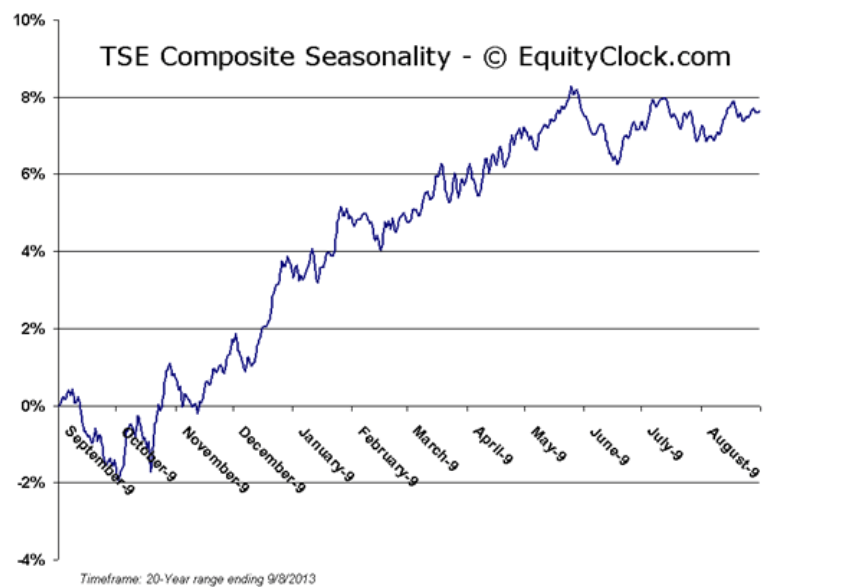
Loss for the S&P 500 between these key dates on the Jewish calendar averages 1.25%. Whichever scenario plays out, caution is warranted as seasonal volatility fuels erratic returns over the weeks ahead.
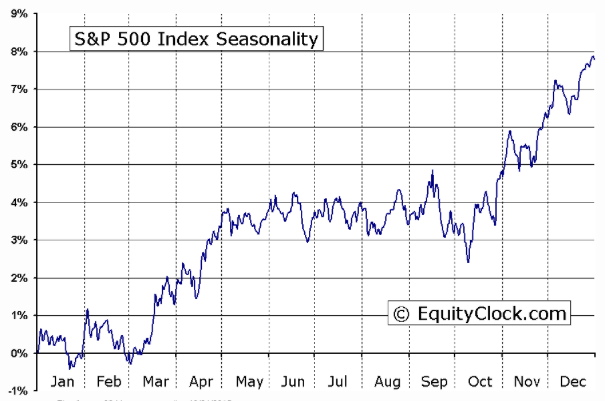
The price action of Gold has received much discussion over recent days as volatility amongst the precious metals has investors questioning whether the seasonal trade has concluded early this year. The price of Gold benefits from a period of seasonal strength starting in July and running through to the start of October as increased demand ahead of a number of end of year holidays, as well equity market volatility through the third quarter, drive the price of the precious metal higher. In July, the price of Gold broke above an intermediate declining trend line and now a long-term declining trendline is being tested. Short-term trend remains positive, derived by a series of higher-highs and higher lows. Reason to be optimistic of the intermediate trend is now being provided. The 50-day moving average is starting to curl positive for the first time in a year. As well, a reverse head-and-shoulders pattern can be picked out on the chart, offering the possibility of seeing the upside target of 1525 in the near future. Momentum indicators continue to trend positive as well, giving little indication of waning buying pressures, as of yet. The risks to the trade remain obvious (taper talk, situation in Syria, equity market volatility), however, as long as the recent trend of higher-highs and higher-lows remains intact, staying with the trade appears warranted; technicals have yet to show evidence that the short-term trend has changed. Positive inflation expectations since the end of June have acted as a catalyst for higher Gold prices, but in recent weeks the trend in inflation expectations has leveled off, stripping away some of the momentum from the Gold trade. The trend of inflation expectations, which will be highly dependent on the Fed’s actions in the upcoming weeks, warrants close attention due to the leading indications it presents upon the trend of Gold.
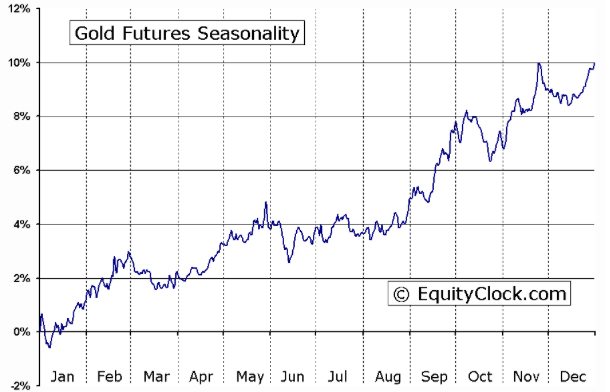
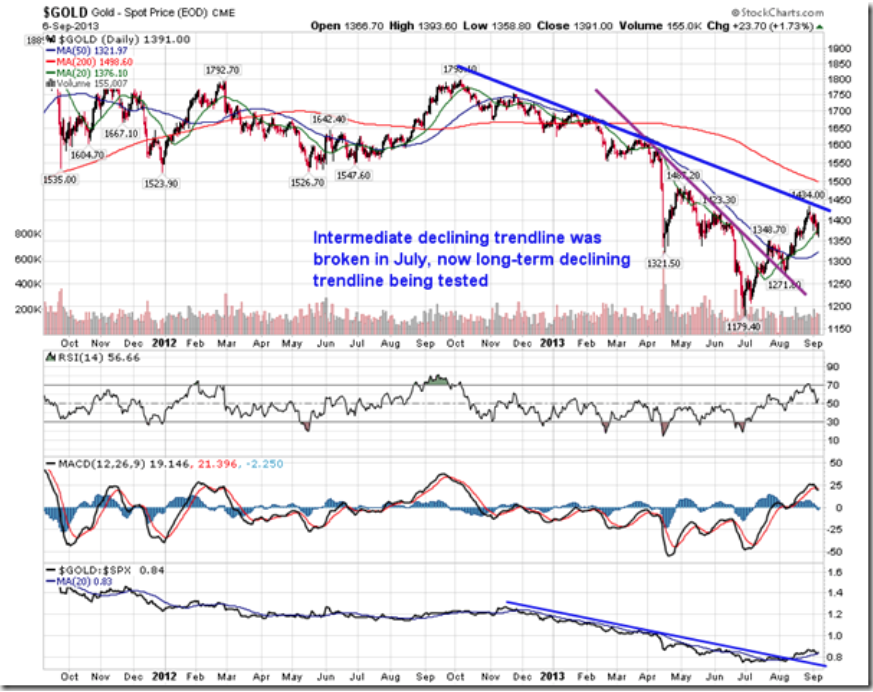
….for many more charts and commentary from Equity Clock on these cycles go HERE
“September Is the Cruelest Month”
While October is technically the worst month for the stock market on a statistical basis due to the propensity for stocks to have crashed during the month, September is actually the month that investors should fear the most.
According to Mark Hulbert, since 1896 (when the Dow Jones Industrial Average was created), the venerable index has lost an average of 1.07 percent during the month of September. And since 1929, the Dow has lost an average of 1.3 percent each time September rolled around. For the record, the average gain for all other months is 0.71 percent. And for those keeping score at home, that’s a spread of 1.78 percentage points, which, statistically speaking, is meaningful.
Hulbert also pointed out that during each of the last nine decades, September’s rank relative to other months in terms of performance has never been higher than ninth. Ugh!
….to continue to read of this article on go HERE


Wall Street play’a
“Straight out of Compton” Not really, more like straight out of Queens NY! Carl Celian Icahn (born February 16, 1936) is an American businessman and investor. He is the majority shareholder of Icahn Enterprises . Carl’s family name was Jewish in name, but his father was a “dogmatic atheist”, also a frustrated opera singer who settled on being a cantor (lead worship in the Jewish community)and eventually a teacher. His mother also worked as a schoolteacher. He graduated from Princeton University with a Bachelor of Arts degree in philosophy in 1957 and then joined New York University School of Medicine, but he dropped out after two years to join the army.
Carl made headlines in 1985 with his ruthless take-over of TWA and set the stage for his role as a vicious and often malicious corporate raider. This Asset stripping model became his modus operandi for corporate take-overs to come. Buy a company and sell the parts to pay the bill. Countless deals and billions of dollars latter Carl is front and center in his efforts to take Michael Dells DELL Computer. Well today he gave up that battle. Below is his letter of resignation or submission of defeat.
“Dear Fellow Dell Inc. Stockholders:
I continue to believe that the price being paid by Michael Dell/Silver Lake to purchase our company greatly undervalues it, among other things, because:
|
1. |
Dell is paying a price approximately 70% below its ten-year high of $42.38; and |
|
2. |
The bid freezes stockholders out of any possibility of realizing Dell’s great potential. |
Although the board accepted Michael Dell/Silver Lake’s offer in February, it promised stockholders that the Company would hold a meeting at which stockholders could make the final decision as whether or not to accept the transaction. The board recommended that stockholders vote in favor of the proposed transaction because it was Michael Dell/Silver Lake’s “best and final offer”. Icahn and Southeastern argued that stockholders should not give up the huge potential of Dell and therefore should reject the proposed transaction. We won, or at least thought we won, but when the board realized that they lost the vote, they simply ignored the outcome. Even in a dictatorship when the ruling party loses an election, and then ignores its outcome, it attempts to provide a plausible reason to justify their actions. Andrew Bary at Barron’s wisely observed, “In an action worthy of Vladimir Putin, Dell postponed a vote scheduled for last Thursday on Michael Dell’s proposed buyout of the company when it became apparent that there was insufficient shareholder support for the deal.” But the Dell board felt they needed no excuse when they changed the voting standard and changed the record date of those eligible to vote, which allowed arbitrageurs to vote a much greater percentage of the stock when the polls reopen and scheduled the annual meeting for October. The board simply relied on the usual “business judgment” catchall and Delaware law to uphold their actions. We jokingly ask, “What’s the difference between Dell and a dictatorship?” The answer: Most functioning dictatorships only need to postpone the vote once to win.
As a result of 1) the change in the record date allowing new stockholders to vote on the proposed Michael Dell/Silver Lake transaction on September 12th, 2) Chancellor Strine’s ruling that a gap period between the September 12th meeting and the annual meeting was legal under Delaware law and 3) the raise in the bid by Michael Dell/Silver Lake, we have determined that it would be almost impossible to win the battle on September 12th.. We have therefore come to the conclusion that we will not pursue additional efforts to defeat the Michael Dell/Silver Lake proposal, although we still oppose it and will move to seek appraisal rights.
I realize that some stockholders will be disappointed that we do not fight on. However, over the last decade, mainly through “activism” we have enhanced stockholder value in many companies by billions of dollars. We did not accomplish this by waging battles that we thought we would lose. Michael Dell/Silver Lake waged a hard fought battle and according to Chancellor Strine, the actions by Dell were within the Delaware law. We therefore congratulate Michael Dell and I intend to call him to wish him good luck (he may need it).
While we of course are saddened at our losing the battle to control Dell, it certainly makes the loss a lot more tolerable in that as a result of our involvement, Michael Dell/Silver Lake increased what they said was their “best and final offer”. As a result of this increase all stockholders are to receive many hundreds of millions of dollars more than the board originally accepted. We will never know how much more stockholders might have received if the board had allowed the annual meeting to proceed at the same time as the rescheduled special meeting which we believe would have put pressure on Michael Dell/Silver Lake to increase their bid.
One of the great strengths of our country is that we abide by the rule of law. However, state laws dealing with corporate governance often favor incumbent corporate boards and management and are weak in many areas. While we must abide by these laws, we believe that they can and must be changed. Among many other things, boards should not be able to treat elections as totalitarian dictatorships do; where if they lose, they simply ignore the results.
The Dell board, like so many boards in this country, reminds me of Clark Gable’s last words in “Gone with the Wind,” they simply “don’t give a damn.” If you are incensed by the actions of the Dell Board as much as I am, I hope you will choose to follow me on Twitter where from time to time I give my investment insights. I also intend to point out what I consider to be unconscionable actions by boards and discuss what remedies shareholders may take to change the situation.
I wish to take this opportunity to thank all Dell shareholders who supported Southeastern and Icahn.
Very truly yours,
Carl Icahn”

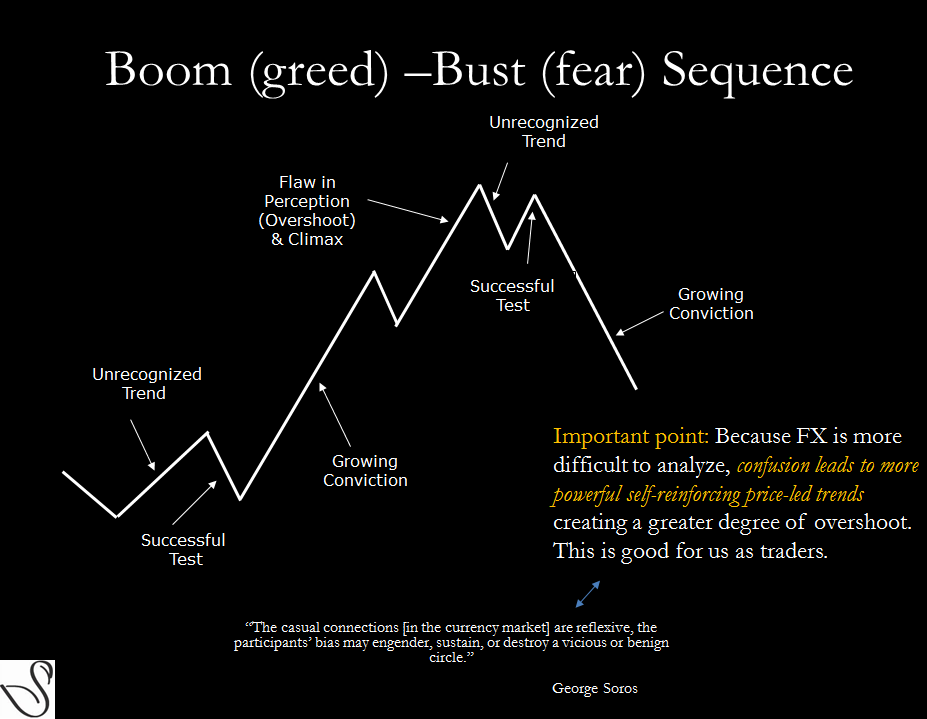 I layout my best available insight about the currency markets on a daily basis. I tried to sound “smart.” Often I tried to convey some sense of prescience I may have about currencies. But I have no “gift of hindsight,” few of us do. I know that. And because I have seen some very strange things happen over the years that have drained more money from my trading account than I care to talk about (or let my wife know about), I do my best to approach markets as a game of probabilities. I think it’s the right way to do it.
I layout my best available insight about the currency markets on a daily basis. I tried to sound “smart.” Often I tried to convey some sense of prescience I may have about currencies. But I have no “gift of hindsight,” few of us do. I know that. And because I have seen some very strange things happen over the years that have drained more money from my trading account than I care to talk about (or let my wife know about), I do my best to approach markets as a game of probabilities. I think it’s the right way to do it.

 Earlier today, Charlie Rose who traveled to Damascus previously, interviewed Syria’s president al-Assad at the presidential palace. The interview will air in its entirety on PBS’s “Charlie Rose” show on Monday night just as Obama’s full media campaign to push for a Syrian war is peaking. In the interview, previewed by Rose on CBS’s “Face The Nation” on Sunday morning, Assad denied that he had anything to do with the chemical weapons attack that took place on August 21, 2013 and that there was no evidence that he had “used chemical weapons against my own people”. Rose also said the Syrian president would not confirm or deny that the regime has chemical weapons. When asked if Assad though there would be an attack, the president told him “I don’t know.”
Earlier today, Charlie Rose who traveled to Damascus previously, interviewed Syria’s president al-Assad at the presidential palace. The interview will air in its entirety on PBS’s “Charlie Rose” show on Monday night just as Obama’s full media campaign to push for a Syrian war is peaking. In the interview, previewed by Rose on CBS’s “Face The Nation” on Sunday morning, Assad denied that he had anything to do with the chemical weapons attack that took place on August 21, 2013 and that there was no evidence that he had “used chemical weapons against my own people”. Rose also said the Syrian president would not confirm or deny that the regime has chemical weapons. When asked if Assad though there would be an attack, the president told him “I don’t know.”












